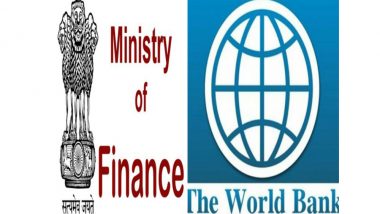New Delhi, May 31: The Indian government and the World Bank on Thursday signed a USD 500 million loan agreement to provide additional financing for the Pradhan Mantri Gram Sadak Yojana (PMGSY) Rural Roads Project, implemented by Ministry of Rural Development. The PMGSY will build 7,000 km of climate resilient roads, out of which 3,500 km will be constructed using green technologies.
The World Bank has supported PMGSY since its inception in 2004. So far it has invested over USD 1.8 billion in loans and credits mostly in the economically weaker and hill states across North India - Bihar, Himachal Pradesh, Jharkhand, Meghalaya, Rajasthan, Uttarakhand, and Uttar Pradesh. It has built and improved about 35,000 km of rural roads and benefited about eight million people with access to all-weather roads.
The loan agreement for the project was signed by Sameer Kumar Khare, joint secretary, Department of Economic Affairs, Ministry of Finance, on behalf of the government of India and Junaid Ahmad, country director, World Bank India, on behalf of the World Bank in the presence of Alka Upadhyaya, joint secretary (RC), Ministry of Rural Development. "The PMGSY over the years has brought about a paradigm shift in the way rural roads are mapped, designed, monitored and built, involving communities especially women," said Khare.
"The additional finance will bring a new shift in construction technology using green and low carbon designs and climate resilient construction techniques. Now more rural communities will have access to better economic opportunities and social services," Khare added.
Adequate maintenance of the existing 4.6 million km of the road network is emerging as a major challenge. Many parts of the existing road network are either vulnerable to or have already suffered damage from climate-induced events such as floods, high rainfall, sudden cloudbursts and landslides. "To support the rural economy and communities and households that depend on rural livelihoods, it will be critical to ensure that infrastructure is built and maintained to withstand climatic changes," said Junaid Ahmad, World Bank Country Director in India.
"This project will demonstrate how climate resilient construction can be integrated in the strategy and planning of rural roads," he added. The PMGSY and the Bank's involvement under this additional financing will emphasise on managing the rural road network through green and climate-resilient construction using green, low-carbon designs and new technologies - far beyond merely funding civil works. This will be done through the following measures: climate vulnerability assessment during the design process to identify the critical locations affected by floods, water-logging, submergence, cloudbursts, storms, landslides, poor drainage, excessive erosion, high rainfall, and high temperatures.
Special treatment for flood-affected areas through adequate waterways and submersible roads to allow easy passage of water, use of concrete block pavements, and improved drainage; use of environmentally optimised road designs and new technologies which uses local and marginal materials and industrial by-products such as sand, local soils, fly ash, brick kiln wastes, and other similar materials in place of crushed rocks; innovative bridges and culverts through use of pre-fabricated/pre-cast units for roads and bridges having better ability to withstand earthquakes and water forces such as continuous beams, bearing free construction, and river training works; use of hill cutting material in hill roads ensuring its productive use and resolving its disposal problem, use of bio-engineering measures, improved drainage and other treatments for landslide prone areas and providing adequate slope protection.
The additional financing will also fill the gender gap by creating employment opportunities for women in construction and maintenance. The earlier project had piloted community-based maintenance contracts through women self-help groups (SHGs) for routine maintenance of 200 km of PMGSY roads in Uttarakhand, Meghalaya and Himachal Pradesh.
SHG-run maintenance contracts will now be extended to about 500 km of roads over five states. "All components of the project will have substantial climate co-benefits and help road agencies in India to substantially minimise GHG emissions. Improving road conditions alone will result on an average in direct savings of 2.68 million tons annually in GHG emissions and minimise the annual losses of about USD 9 billion in the road asset value and an equal amount by way of high vehicle operating costs," said Ashok Kumar, senior highway engineer and World Bank's task team leader for the project. The USD 500 million loan, from the International Bank for Reconstruction and Development (IBRD), has a three-year grace period, and a maturity of 10 years.













 Quickly
Quickly




















